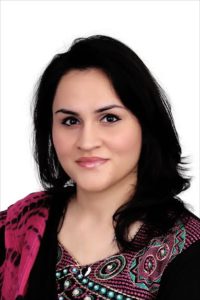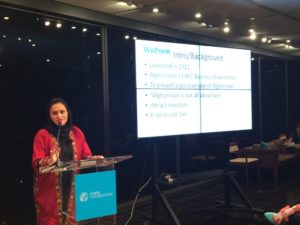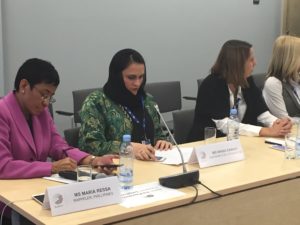Tap into the collective power of influential business and NGO pioneers to create new strategies and
tactics to build a more socially and environmentally conscious world.

Tap into the collective power of influential business and NGO pioneers to create new strategies and
tactics to build a more socially and environmentally conscious world.
Company/NGO Name:
Wadsam-Afghanistan’s First Business News Portal

1. What is the mission of your company/NGO?
Our mission is to be a well-known business news portal that provides its readers with the most recent and updated articles about the economic development of Afghanistan. Wadsam aims to project and promote a positive image of Afghanistan and to be an active participant in the growth and development of the Afghan community.
 2. What is the most innovative or environmentally/socially impactful project/practice your company/NGO has implemented?
2. What is the most innovative or environmentally/socially impactful project/practice your company/NGO has implemented?
Wadsam is the only news website in Afghanistan that merely focuses on positive stories from Afghanistan. It is a great resource for investors to learn about business and investment opportunities in Afghanistan. We work to remind the world that Afghanistan is not all about war.
3. How have those projects positively impacted the local community and/ or your country?
Investors and businesses have contacted us about a particular business after reading an article about it. Students have used our portal as a resource for their college theses. We publish about women’s businesses to help them find customers for their products. What gives us the most satisfaction about our work is when some people tell us that they visit our website only to read something positive about our war-torn country.
4. Please share any new projects you will be implementing in the near future.
We have just started introducing an Afghan female entrepreneur every month. We would like to continue with this. The world knows very little about the accomplishments and contributions of our women to the social and economic development of Afghanistan. My dream is to incorporate an e-commerce platform into my portal where Afghan businesswomen could showcase their products and sell those internationally. One of the major challenges facing Afghan women businesses is lack of a proper market.
5. What are your top 3 career accomplishments?
I am the owner of a business news website. As an Afghan woman, this is a great accomplishment since our patriarchal society looks down upon women in media.
In addition to running a website, I was also the Administration Manager at Afghanistan’s first and largest insurance corporation. I became the first Afghan to complete a certification in insurance through the Chartered Insurance Institute of the United Kingdom.
I always wanted to become the voice of the thousands of Afghan women who have remained silent for years towards abuse, violence and harassment. Today, I write about these women to international and local websites and blogs to remind them that they are not alone. I talk about our women’s success stories, perseverance and achievements in my writings. I am a volunteer for Free Women Writers, a non-profit that works to improve the lives of Afghan women through advocacy, storytelling and education. I have also freelanced for News Deeply, a news agency based in New York.
6. What inspired you to choose your career path?
I have worked for the public sector, private sector and media in Afghanistan. So, my career path has been all over 🙂 However, every path I have stepped into, my ultimate goal was to serve my country, my people. As a woman who has received education in the US, I always knew my education and skills were marketable in my country and any small contribution would make a huge difference. Despite the challenges and obstacles I have faced as a woman in Afghanistan, I continue to somehow contribute to the rebuilding of my country.
7. Personally—Why do you care about sustainability? What is your story?
Throughout my career in Afghanistan, I always felt the lack of sustainable growth and development in Afghanistan. Despite the influx of billions of aid Afghanistan that has helped improve GDP growth, education, infrastructure and child and maternal health, Afghanistan is still fighting poverty and has a long way to go to catch up with the rest of the developing world. One of the reasons for this is the poor management of foreign aid. Aid to Afghanistan is hardly invested in something that ensures sustainability. Over the past 17 years, aid is dumped in a rush causing inflation, fostering corruption and creating a culture of aid dependency. Our businesses, NGOs and even the government still rely on foreign aid for survival. Therefore, I have always cared about sustainability and always wondered how Afghanistan would have been a different country if local communities and local actors were involved in the aid management; if their needs and their voices were taken into consideration. Lack of economic empowerment of women has also hampered sustainable growth. Women alongside men are needed to stabilize Afghanistan.

8. What is/are the biggest incentive(s) for businesses in your country to adopt sustainable practices?
The government subsidizes lands for businesses, offers tax exemptions and low-interest loans for farmers.
9. What is/are the biggest environmental or social challenge(s) facing your country today?
While I am proud of the progress our women have made in various spheres, I still see women’s rights as one of the major social challenges facing Afghanistan. Sexual harassment, gender-based violence, access to education and discrimination are major issues preventing women’s progress.
Major environmental challenges are deforestation, air and water pollution and soil degradation. Pollution caused by illegal mining has also become a major concern. Illegal mining is responsible for soil erosion and contamination of water along with the health issues it causes to the artisans and the local communities.
10. What is the most positive action your country has taken to positively impact its environment or social well-being?
On the environment front, the government has launched campaigns to plant trees all across the country. Last year, a campaign was launched to plant more than two million trees across the country in one week. The government also rolled out new measures for solid waste management in different parts of Kabul city last year in December. Kabul municipality fines and prosecutes those who litter.
The Afghan president participated in city cleaning along with hundreds of volunteers on the World Environment Day in 2016 in an effort to encourage citizens to take responsibility for keeping their city clean.
Bonus Questions:
1. What are your thoughts on climate change? What is your company/organization doing to help bring awareness or to help mitigate climate change?
Climate change is a global issue, and Afghanistan is the most vulnerable country facing the ravages of climate change. The biggest climate hazards in the country are drought and floods, caused by irregular snowmelt or rainfall. However, research and awareness on the topic of climate change in Afghanistan are very limited.
One of the ways that Wadsam contributes to help mitigate climate change is by publishing stories on the usage of solar energy, sustainable farming and planting trees.
2. How dedicated are your nation’s businesses to corporate social responsibility? List some practices you think would be helpful.
The idea of CSR is nascent in Afghanistan; however, we have mobile network operators like Roshan who have well-developed CSR outreach programs that include health, education, job creation and environmental protection. Roshan has been recognized by Forbes and B Lab for its social responsibility mission.
Our mining companies are required by law to implement a community development agreement that includes details of the firm’s environmental and social impact assessment.
Some practices that I think could be very helpful would be for companies to invest in local communities by building schools, offering medical services or improving irrigation and sanitation equipment.
To learn more, please visit Wadsam on Facebook, Instagram, and Twitter:
Twitter: @wadsamnews
Facebook: @wadsam
Instagram: @wadsamnews
Website: www.wadsam.com